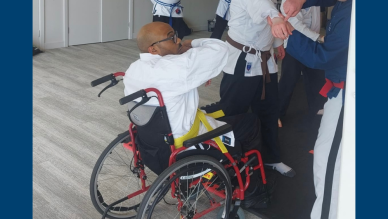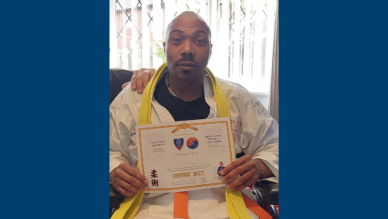Determined not to tap out of exercise, wheelchair user Christopher discovered a form of Ju Jitsu that was just right. Find out how it improves his mental and physical health.
I was diagnosed with relapsing remitting multiple sclerosis in 2014, which shocked me and my family. To be honest, I didn’t know what MS was.
All I knew was that there wasn’t a cure. I did a bit of helpful research. At first, I was in denial, but eventually the reality sank in. I started to notice symptoms ranging from optic neuritis to muscle weakness and mobility issues.
After diagnosis, I was referred to Liverpool Walton Centre for treatment. I was put on a disease modifying drug (DMD) called Rebif. My first relapse, which affected my eyesight, changed my whole life and I had to review my career working as a personal trainer.
I got a new job working in Tesco as a supermarket security guard. This only lasted a short time, due to the long hours and my need to manage the symptoms of my condition. I didn’t feel that the job was suitable for me and my MS. So, I applied to work for the NHS on a part time basis working at Alder Hey Children's Hospital as a domestic assistant, cleaning the clinics and wards.
I found the hours in this job more suitable. Plus, my employers were very understanding once they knew about my medical condition and how it affected me personally.
After a couple of years, my condition deteriorated.
My circumstances changed and I was redeployed to a different job position. This time, I was working temporarily for the PALs department, helping the volunteers in the hospital. I continued in this position until 2018.
However, I had to take some time out to focus on adapting and rebuilding my life in a wheelchair.
I was encouraged to take up exercises such as tai chi and seated yoga to manage my condition. However, I didn’t feel confident enough to proceed and neither practice really interested me.
I wanted to improve my confidence and martial arts came to mind. After positive feedback from my medical practitioners that it would be safe for me to do it, I rang various dojos in Liverpool.
A lot of them said that they couldn’t teach me due to their lack of experience in dealing with a wheelchair user. But I didn’t want to give up my journey. Considering that I had only just started it, I felt that it would give me a purpose and something to focus on.
Eventually, I found an instructor in Seaforth, Liverpool called Peter who was willing to teach me the disciplines.
At first, I started by having private one-to-one sessions. After a few weeks, I was invited to visit the dojo to train full time. I felt that learning the techniques helped to improve my physical attributes as well as my mental wellbeing.
At first, I felt very nervous that I was stepping out of my comfort zone. I was doubtful that this practice could be done by a wheelchair user.
But it turned out that the practice improved my cognitive skills and ability to focus. So far, I have achieved my orange belt and I’m currently preparing for my next grading a green belt.
I hope to eventually achieve my black belt and to be able to pass on my knowledge to other people.
It’s possible to adapt.
Life shouldn’t be just seen as a sprint. It could also be seen as marathon. Either way, we can all reach the finish line.





